August 2024
in line
1 August 2024, around 9.19.
The first peculiarity which strikes us when we reflect on the equivalent form is this, that use-value becomes the form of the appearance of its opposite, value.
It is supposed to be warm today. We have been out of town due to the great building repair (which should perhaps be put in capital letters, as that precious sort of capitalization can be heard when we talk about it), so the apartment hasn’t really been prepped for summer – no air conditioners, no curtains in the sunnier windows. This morning, then, was spent in putting up those curtains, which strain the sunlight a jarring yellow, and watching the temperature outside to choose the precise moment when it would be most inconvenient to close the windows. We always seem to miss the moment when closing the windows and curtains would actually keep things cool, but what would be the value in that?
poise
2 August 2024, around 9.26.

The stack of books I am more or less in the middle of. I will be grateful to finish Night Thoughts, but the prospect of finishing The Death of Vazir-Mukhtar is slightly melancholy (although I’ve already lingered over it for months and months [and months and months]).
august thirst
3 August 2024, around 13.49.
If Wisdom is our Lesson (and what else
Ennobles Man? what else have Angels learn’d?),
Grief! more Proficients in thy School are made,
Than Genius, or proud Learning, e’er could boast.
Voracious Learning, often over-fed,
Digests not into Sense her motley Meal.
This Book-Case, with dark booty almost burst,
This Forager on others Wisdom, leaves
Her Native-Farm, her Reason, quite untill’d.
With mix’d Manure she surfeits the rank Soil,
Dung’d, but not drest; and rich to Beggary.
A Pomp untameable of Weeds prevails.
Her Servant’s Wealth, encumber’d Wisdom mourns.And what says Genius? “Let the Dull Be Wise.”
Genius too hard for Right, can prove it Wrong;
And loves to boast, where blush Men less inspir’d.
It pleads Exemption from the Laws of Sense;
Considers Reason as a Leveller;
And scorns to share a Blessing with the Croud.
That Wise it could be, thinks an ample Claim
To Glory, and to Pleasure gives the rest.
Crassus but sleeps, Ardelio is undone.
Wisdom less shudders at a Fool, than Wit.But Wisdom smiles, when humbled mortals weep.
- Spelling, punctuation &c. following Cornford’s edition, which features an adequate but not exhaustive commentary.[↩]
pseudaphoristica (23)
4 August 2024, around 11.21.
The economical hobby of using pathetic fallacy to achieve the alchemical transformation, not of base metals into gold, but of worth (or value) into meaning.
punctual
5 August 2024, around 7.47.
At one in the morning, the dog barks to announce the onset of unexpected rain and a thunderstorm. The next hour sees frequent lightning, and only the rain prevents the immediate worry of conflagration. The dog sniffs the air at the open door, listens to the rat-tat-tat of the rain, and heaves a sigh before wandering off to go back to sleep. I stay awake to listen for a while longer.
graveling
6 August 2024, around 18.08.

The road not lately taken.
social currency
7 August 2024, around 18.18.
The name of a thing is entirely external to its nature. I know nothing of a man if I merely know his name is Jacob. In the same way, every trace of the money-relation disappears in the names pound, dollar, franc, ducat, etc. The confusion caused by attributing a hidden meaning to these cabalistic signs is made even greater by the fact that these money-names express both the values of commodities and, simultaneously, aliquot parts of a certain weight of metal, namely the weight of the metal that serves as the standard of money. On the other hand, it is in fact necessary that value, as opposed to the multifarious objects of the world of commodities, should develop into this form, a material and non-material one, but also a simple social form.
gathering
8 August 2024, around 16.13.

You watch the light turn yellow, not from newly hung curtains, but from smoke some two or three mountain ridges away; not enough particulates to make a Jacob’s ladder but enough to carry the echo of a scent. You read the daily reports, to see where lightning has struck, though acts of god and man are fairly indistinguishable in their effects. You read about masticators and skidders, about humidity and duff – all presented dryly, in the terse, spare language of incident reports and poetry. You read about the moss, the moss that should transforms trees into jolly green scribbles, that moss that is now dry, strangling and tormenting tree limbs and saplings into a twisted tableau for a game of charades someone else is playing; it forms a ladder carrying flames from floor to canopy. Yet it is the same moss that catches the light so indifferently, so benign, in that poem by Wang Wei.
the best of bees
9 August 2024, around 18.00.
Buzzing about in the small comforts of routine. Avoiding even the hint of a thought.
the other side
10 August 2024, around 12.55.
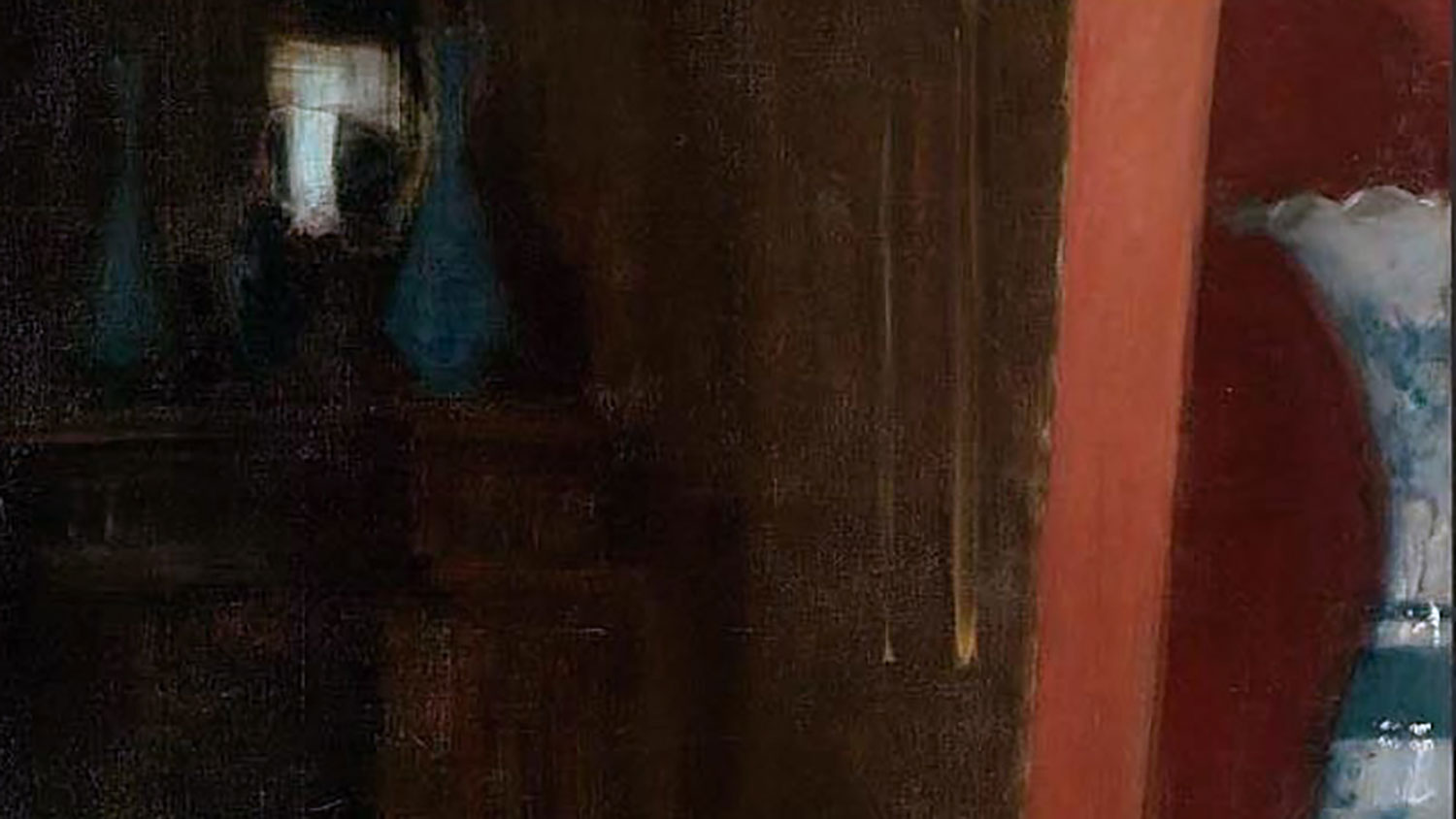
Yoko Tawada’s Paul Celan and the Trans-Tibetan Angel (i.e., Paul Celan und der chinesische Engel) has a promising start – the patient narrator providing a disorienting sense of isolation/alienation at once physical, intellectual, and emotional – but I had to set it aside. As others have noted, the novella draws heavily on the work of Celan, of which I remain mostly ignorant, so in reading I was discomfited by the sensation of things missed, of meanings distorted or misunderstood, of references lost. But mostly I didn’t (don’t) understand how der chinesische Engel became the ‘trans-Tibetan Angel’ (see, perhaps, previous sentence), and it made me cranky, as well as making me feel stupid – a particularly infelicitous combination. I felt (feel), obscurely, that this was part of the intended effect or mood to be conveyed but, well, as much as one may admire minor literary meannesses, I am in no temper for them at the moment.
lunatic
11 August 2024, around 20.40.
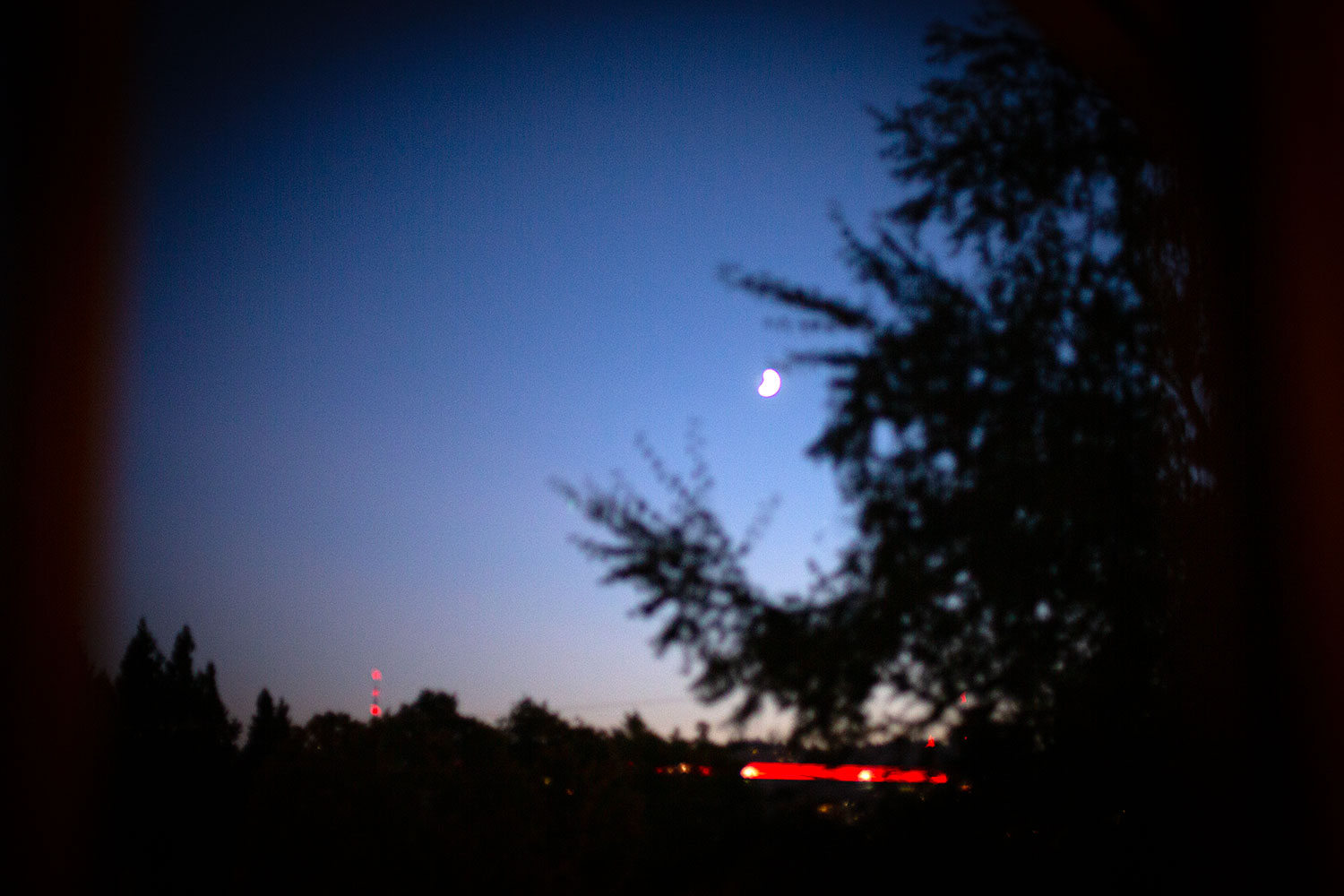
Night is fair virtue’s immemorial friend;
The conscious moon, through every distant age,
Has held a lamp to wisdom, and let fall,
On contemplation’s eye, her purging ray. (V.177–180)* * *
Were moon, and stars, for villains only made?
To guide, yet screen them, with tenebrious light? (IX.964f.)
- Consistency, hobgoblins, etc.[↩]
gutsiness
12 August 2024, around 10.45.
…if we are to understand their world, we must try to project ourselves into minds very remote from our own and endowed with these unfamiliar powers. A world in which men naturally talk of the lip of a cup, the teeth of a rake, the mouth of a river, a neck of land, handfuls of one thing, the heart of another, veins of minerals, bowels of the earth, murmuring waves, whistling winds, smiling skies, groaning tables and weeping willows – such a world must be deeply and systematically different from any in which such phrases are felt, even remotely, to be metaphorical, as contrasted with so-called literal speech.
The farmers of the public revenue never find the laws too severe, which punish any attempt to evade the payment of a tax. They have no bowels for the contributors, who are not their subjects, and whose universal bankruptcy, if it should happen the day after the farm is expired, would not much affect their interest.
- Cf. ὃς δ’ ἂν ἔχῃ τὸν βίον τοῦ κόσμου καὶ θεωρῇ τὸν ἀδελφὸν αὐτοῦ χρείαν ἔχοντα καὶ κλείσῃ τὰ σπλάγχνα αὐτοῦ ἀπ’ αὐτοῦ, πῶς ἡ ἀγάπη τοῦ θεοῦ μένει ἐν αὐτῷ; and ‘These objects, gold and silver, just as they come out of the bowels of the earth, are forthwith the direct incarnation of all human labour. Hence the magic of money’ (Marx, Capital, 1.187).[↩]
revolutionary changes
13 August 2024, around 15.04.
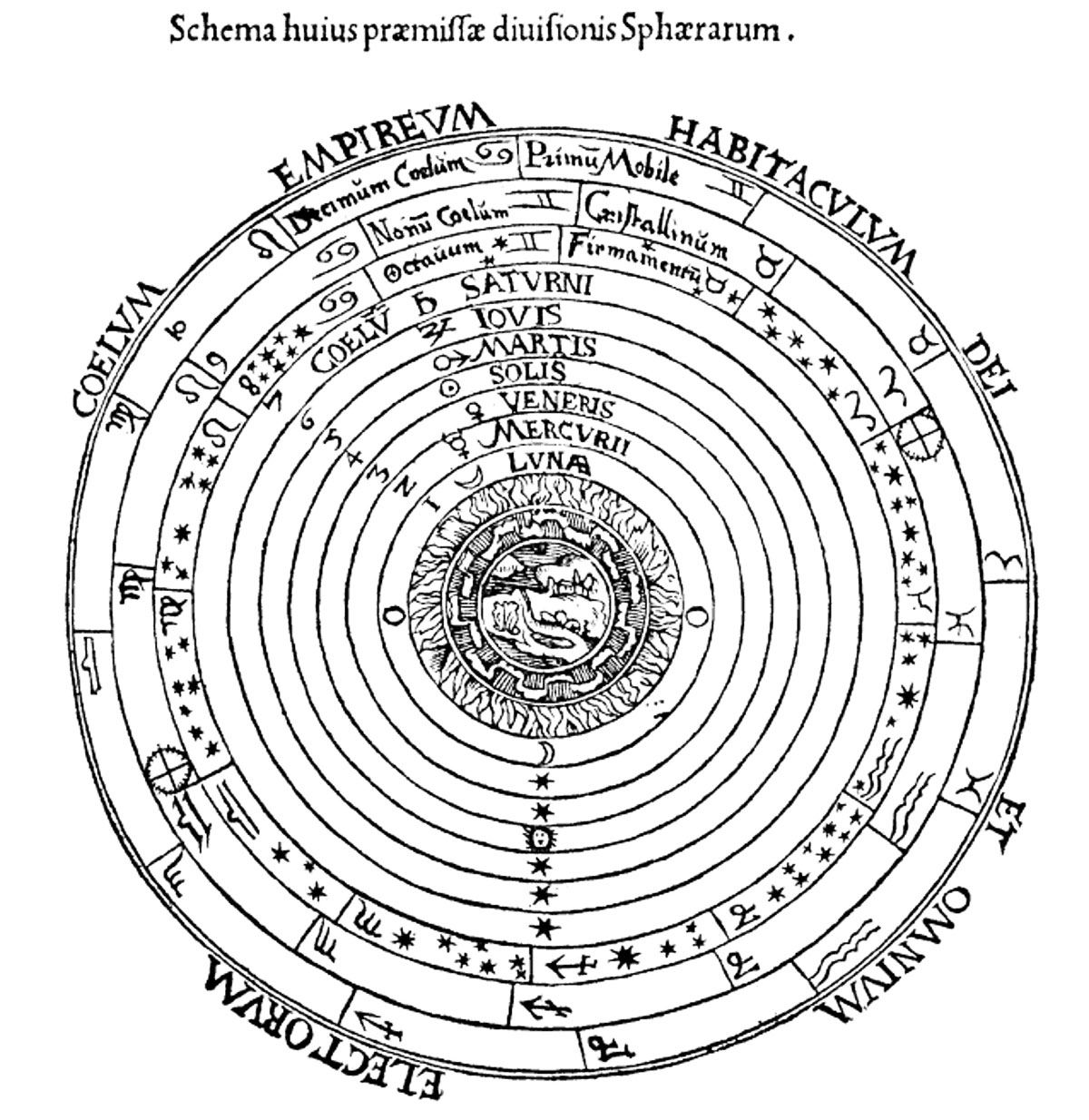
Editing involves so many arbitrary changes to suit style (serial comma), to avoid baiting someone else’s bête noire (‘since’ only allowed as a temporal adverb), or to satisfy the conventions of genre and jargon (‘discriminating power’). My latest arbitrary textual reaction is to ‘revolves around’, as in ‘the conversation revolved around the sound of chymes’ (to be nonsensical about it); it seems to me that unless some sort of circular motion (physical or logical) is involved, that this locution should be avoided as being at best imprecise and at worst (well, to me) inelegant. In short, for the moment, I dislike it – but perhaps I’ll come around.
baton
14 August 2024, around 16.35.
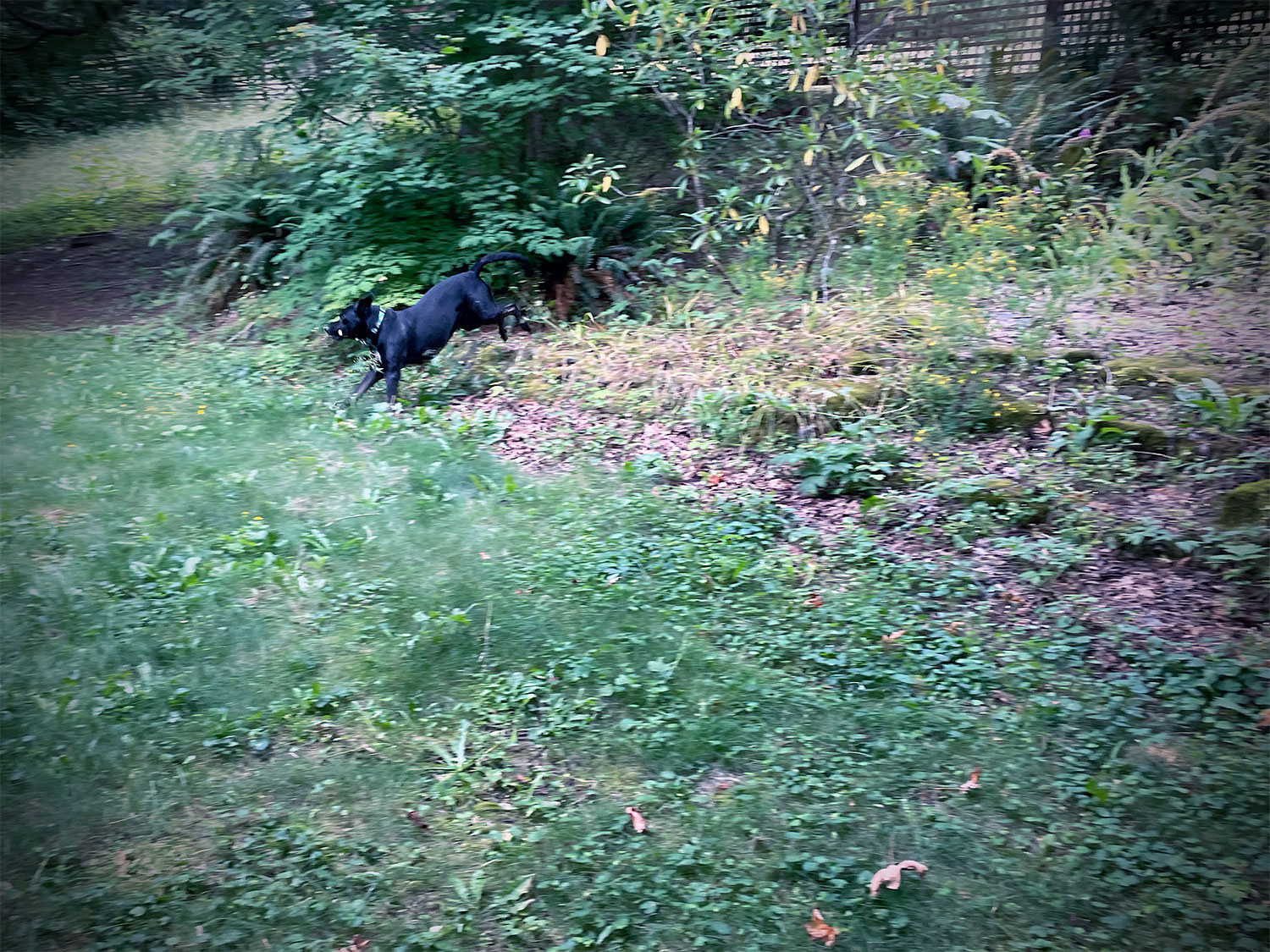
There are several large piles of sticks and fallen branches that need either to be burned (during burn season) or chipped by a brush chipper (during wildfire season). As it is wildfire season, the deadfall needs to be slowly moved from several smaller inconveniently located piles to one larger pile where the chipper can get at it. The dog, as you can see if you squint, bears a small stick in her mouth, confident that she is, at last, being helpful.
sopor
15 August 2024, around 15.24.
He requested three convenient, interconnected rooms. He went to bed and slept like a log all through the night. Now and again, his sleep was disturbed by the wallpaper design and the shuffle of slippers in the corridor. The unfamiliar furniture creaked unusually loudly. It was as if he had sunk deep into the heavy, soft sofa that enshrouded him on all sides, as if he had fallen right through it, and the hotel curtains on the windows seemed to have been drawn for all eternity.
arrheton
16 August 2024, around 10.09.

…the resistance of the material must be scrupulously respected.
hail
17 August 2024, around 17.04.
Am trying to stay up to date on the housekeeping, which usually ends of happening (for the larger tasks) on the weekend. So today was spent scrubbing the propane tank and trimming some of the smaller branches on the trees near the property line and hauling the refuse over to a pile for the brush chipper. The boundary between the grove by the woodshed and the neighbor’s meadow feels more porous, as though ready for something to march through. A few hours later a thunderstorm swept through, with dime-sized hail and rain. The light was doom-laden and the sound unsettling, but everything outdoors smelled fresh and thankful for the water, which had been absent for most of the summer.
inventio
18 August 2024, around 7.48.
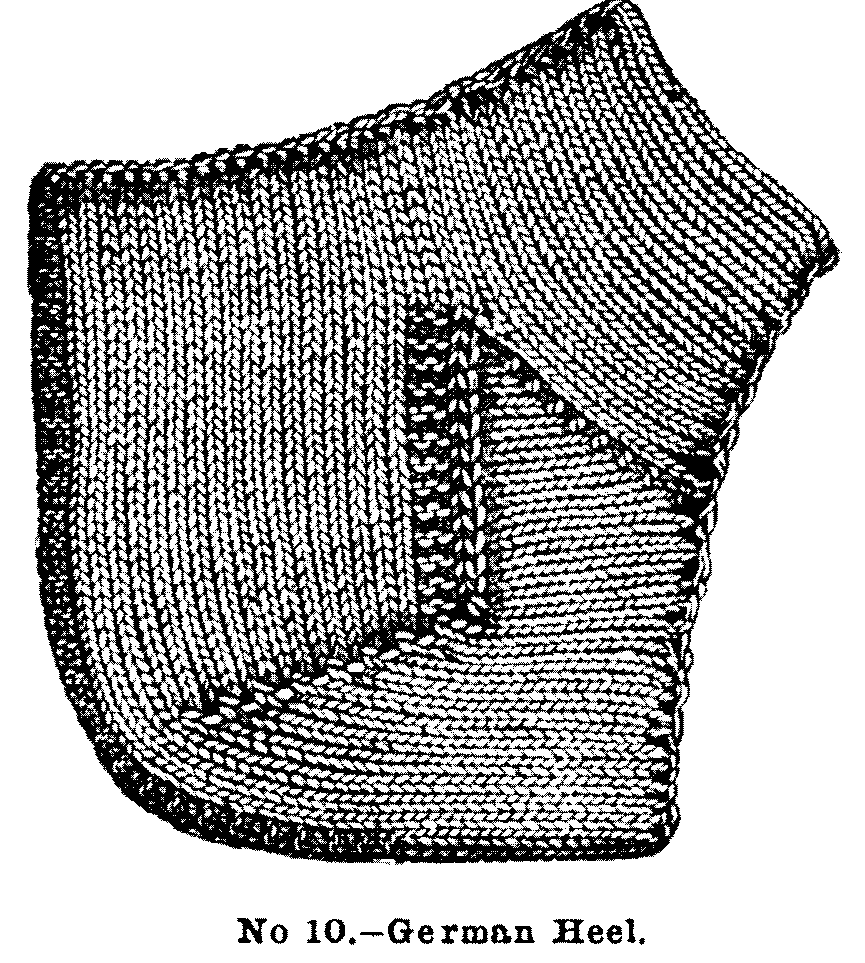
Unfortunately I have forgotten how to turn a heel. The men make an effort to help me out with this. In desperation we unravel one sock after another in an attempt to fathom the mystery of the stitch. What makes it worse is that grandmothers in the north knit differently from Germans. There is great agitation. With beads of sweat on their brows and swearing horribly, holding the thin needles in their heavy hands, the men try with a kind of lunatic fervour to invent new knitting patterns for socks. My husband works according to a complicated system constructed on a geometrical formula, while Karl simply and happily knits long tubes pulled together at one end.
applied economics
19 August 2024, around 18.18.
The tree service came today to do the brush chipping. It was rather a large pile of deadfall and branches trimmed in a haphazard attempt to meet fire safety standards. It took hours and hours (of good, healthy exercise, naturally) to gather everything together, and I imagined it would take hours and hours (or an hour) to chip it all into smithereens (I will admit that I was perhaps judging by how long it would take me to do it). With an excavator 1 and an industrial chipper, it took less than twenty minutes. Naturally, this was the same day I ready the chapter in Capital, vol. 1, on ‘the production of relative surplus-value’.
- I would have called it, erroneously, a backhoe, but I looked it up and am moderately dubious that I have chosen the correct piece of machinery I would not be comfortable operating.[↩]
glimmer
20 August 2024, around 19.39.

Pausing to watch the morning light and consider the fausses fraises de production. 1
- We must be permitted our little jokes.[↩]
precepts
23 August 2024, around 18.23.
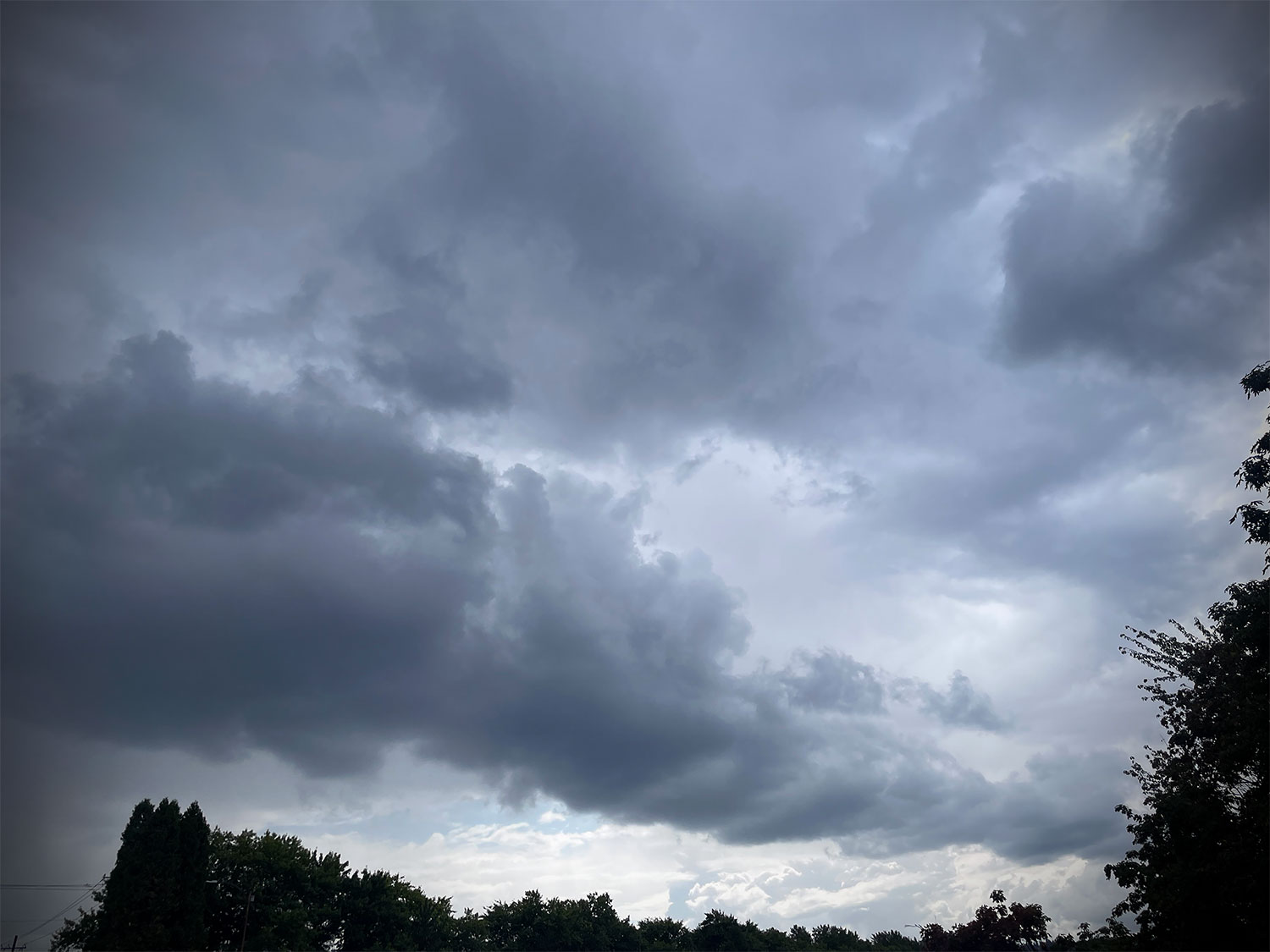
It is most surprising that men have believed they could make rules take the place of such a talent. It is almost as if they wanted to reduce genius to precepts.
not to scale
24 August 2024, around 19.51.
Spending time doing things around the house, small household tasks that are inessential in themselves, but might make things easier, more pleasant, different, anyhow. Then I sit around waiting for the mail to arrive; it has been on hold and there should have been two books in along with the assorted envelopes that look ominous but merely convey the wasteful message that it is not in fact a bill, but rather an explanation of benefits, as though it were to anyone’s benefit to be a nipfarthing about one’s health. But the mail does not contain any of those things, only a misdirected catalogue and small letter from a friend, which was pleasing, but not anticipated. I fill out the online forms to gripe about the missing parcels, but feel off-kilter and out of sorts – unsatisfied. So easy a thing, to knock oneself off balance.
start your cognitions
25 August 2024, around 17.40.
The story of the sleepers is followed by some moral observations which appear to have no connection with it. But this apparent irrelevance is deceptive…
Slept in this morning until nearly six, when the dog made her desire for breakfast known. Managed to step onto the escalator of habit and move through the morning with a minimum of fuss. There is a comfort in the way habits carry themselves. In some cases, anyhow.
many feet
26 August 2024, around 17.21.

I suppose there are worse things to do than go to the woods (or to the parking lot at the edge of the woods) and take pictures of ferns.
unravelling
27 August 2024, around 16.09.

That avant-garde culture is the imitation of imitating—the fact itself—calls for neither approval nor disapproval.
I was nearly done knitting up a cardigan when I realized that it was entirely wrong. It did not feel right – the yarn I had chosen, though good in itself, was wrong for the fabric, even allowing for the changes wrought by washing. Usually I notice such faults before I am half a sleeve and a button band from finishing, but we cannot always notice the obvious. It lingered in my workbag for nearly a year before I gave up and started unravelling it.
A similar thing happened with something I meant to write here about Sontag’s ‘Notes on Camp’ and Clement Greenberg’s ‘Avant-Garde and Kitsch’; I suppose my problem was that I didn’t really have much to say on the topic, thought I spent a good deal of time gathering up sources and quotations (enough to knit up many a ravell’d sleeve). It was the question of criticism itself as a whole that drew me, I think, and the impulse to comment upon (and judge – morally and aesthetically) the (sub)cultures of another. An ingrained (though not always self-aware) dislike of hypocrisy led to much rewording and deleting and ultimately complete discarding. I suppose a few odd threads showed up elsewhere (here for instance), but for the essay at least, the material felt borrowed, so I am content (or willing to pretend to be content) not to make anything of it.
all’s well
29 August 2024, around 16.58.
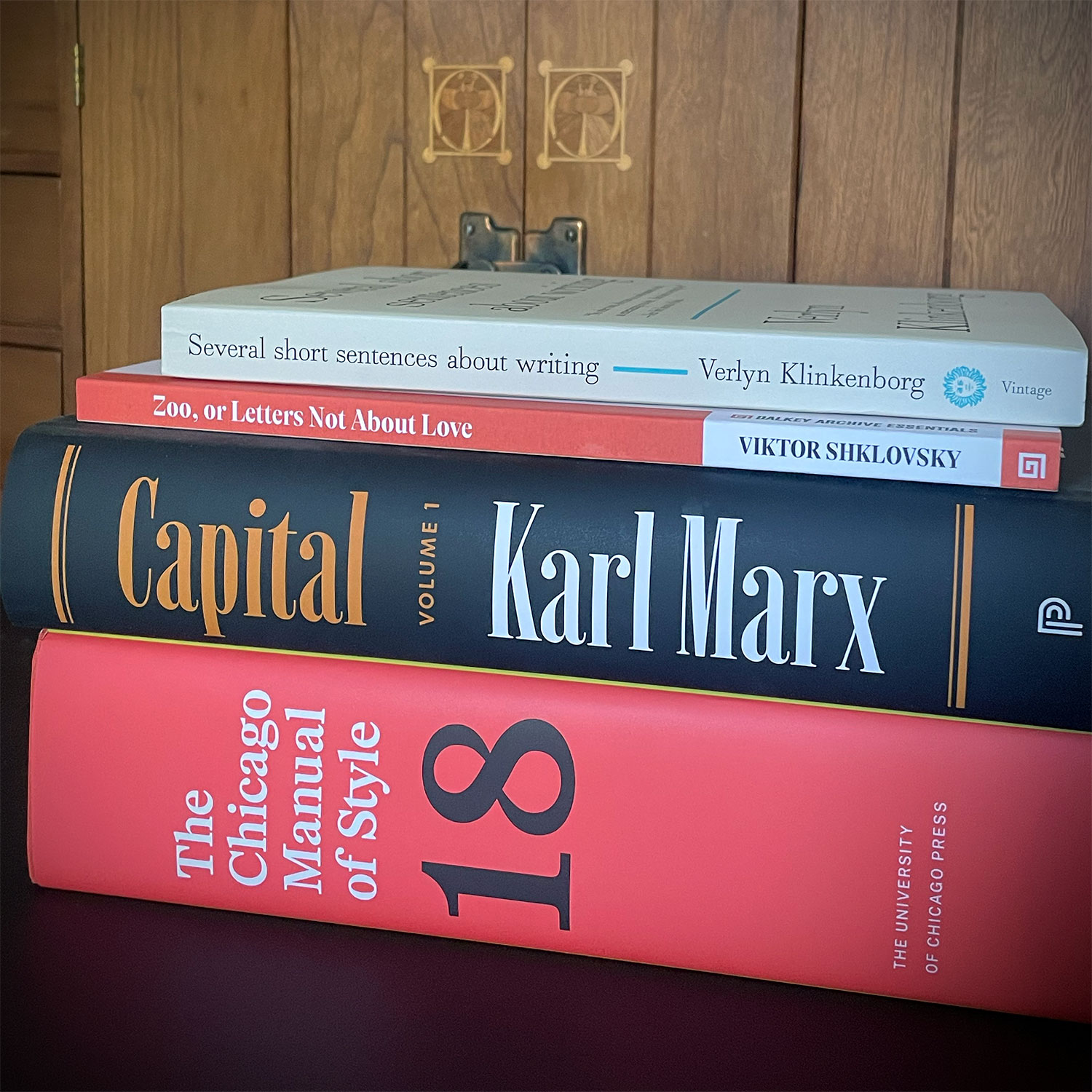
The missing books showed up, so one feels foolish for having worried.
tension
30 August 2024, around 20.03.

It is nearly the end of the month and I have yet to finish Tynyanov’s The Death of Vazir-Mukhtar, which I feel like I have been reading forever, which I feel like I could read forever. Seventy pages from the end I drag myself to read it with reluctance, because each page brings me closer to the promised end (or vision of that sorrow). I flip back and each page is filled with promise and foreboding, narrative time and characters’ plans warp and shimmer, an arrow never moving but always pointed towards a target. As a whole, it provokes a feeling of lassitude and this feeling is not the reader’s, but the book’s, which is an extraordinary artistic effect, if it isn’t entirely a product of my imagination and not the author’s (and translator’s). 1
- I don’t know if I like the book I am reading (or have read) or the book I have imagined as I read it. It is one of those rare occasions where I can’t really tell how closely the two match; they could be the same, but they could be a stereoscopic pair.[↩]
Adversaria (17)
31 August 2024, around 4.11.
‘Karl knows something of every handicraft, and in addition he has the ability, peculiar to nearly all Norwegians, to tackle any situation with the most meagre equipment. He is what the Norwegians call for short an altmüligman—an everything-possible-man’ —Christiane Ritter (A Woman in the Polar Night, trans. Jane Degras, 52%)
‘…the heart of man is a wonderful thing, especially when it is carried in his wallet’ —Karl Marx (Capital, vol. 1, trans. Ben Fowkes, p. 336)
‘The beginning of wealth, of the levity of wealth, is discernible in the act of taking an item from a shelf of food without first checking the price’ —Annie Ernaux (Look at the Lights, My Love, trans. Alison L. Strayer, 40%)
‘Now that I know what a live polar fox is like I no longer want a dead one’ —Christiane Ritter (A Woman in the Polar Night, trans. Jane Degras, 26%)
‘An archetype is in no sense just an annoying prejudice; it becomes so only when it is in the wrong place.’ —C.G. Jung (Four Archetypes, trans. R.F.C. Hull, p. 18)
‘For the first time I realise that in the solitude of an all-too-powerful nature things have a different meaning from that we attribute to them in our world of constant reciprocal relations between man and man. It dawns on me that in many cases it may be more difficult for a man to retain his ordinary humanity in the Arctic than to sustain his life in battle with the elements’ —Christiane Ritter (A Woman in the Polar Night, trans. Jane Degras, 43%)
‘The superstore’s art of making people believe in its benevolence’ —Annie Ernaux (Look at the Lights, My Love, trans. Alison L. Strayer, 75%)
‘Perhaps in centuries to come men will go to the Arctic as in biblical times they withdrew to the desert, to find the truth again’ —Christiane Ritter (A Woman in the Polar Night, trans. Jane Degras, 45%)
‘Through a stunning reversal, it is the machines that look smart and humans stupid. I can’t get used to this [self check-out/superstore] system, either’ —Annie Ernaux (Look at the Lights, My Love, trans. Alison L. Strayer, 78%)
‘And suddenly I realise that civilisation is suffering from a severe vitamin deficiency because it cannot draw its strength directly from nature, eternally young and eternally true. Humanity has lost itself in the unnatural and in speculation’ —Christiane Ritter (A Woman in the Polar Night, trans. Jane Degras, 79%)
